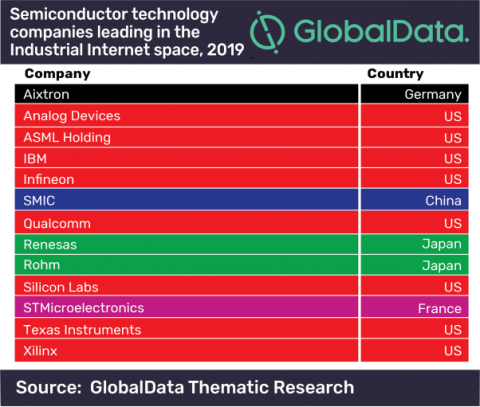

IBM among thirteen companies identified as the semiconductor technology leaders of tomorrow in the Industrial Internet space, says GlobalData
IBM, Qualcomm, STMicroelectronics and Texas Instruments are among the world’s leading semiconductor companies best placed to succeed in the Industrial Internet arena in the next two to five years, according to GlobalData, a leading data and analytics company.
According to GlobalData, the Industrial Internet is one of the top ten themes that will impact the semiconductor sector, alongside data centres, artificial intelligence (AI), high-performance computing, ambient commerce, autonomous vehicles, gaming, 5G, M&A and geopolitics.
Cyrus Mewawalla, GlobalData Head of Thematic Research said, “Microcontrollers and sensors – including accelerometers, heat and humidity components, pressure components, cameras and microphones – will be where much of the value lies in 2019. This calls for industrial grade chips that work to higher reliability standards than chips for consumer applications.”
GlobalData’s latest ‘Semiconductor Scorecard’, analyses the major technology, macro-economic, and regulatory themes impacting semiconductor companies and reveals that Xilinx, Micron, ASML Holding, Analog Devices, Rohm, Aixtron, Renesas, Infineon, and Silicon Labs also make the select group of leading companies in the Industrial Internet theme.
IMAGE FOR PUBLICATION: Please click here for enlarged chart
Mewawalla continued, “Companies who invest in the right themes become success stories with those who miss the big themes.
“In 1999, General Electric (GE) was the largest company in the world by market value. Since 2015, despite being an industrial leader, GE has been falling behind in the Industrial Internet theme.”
GlobalData’s latest Thematic Research report reveals that the Industrial Internet, a market predicted by GlobalData to be worth $145bn by 2023, is part of a fast-evolving ecosystem of intelligent machines running their own logic and communicating with each other.
Leadership of this thriving market is being assumed by software, data analysis, and AI specialists, with industries such as manufacturing, energy, pharmaceuticals, utilities, and agriculture now adopting the sensor and AI technologies that are driving a sea change in how these businesses are run.
For the Industrial Internet to work efficiently, streamed data from a multitude of sources must be collected and often analysed in real-time, with the results fed back to the industrial applications that generated the data.
Mewawalla added, “In the Industrial Internet, the take-up of sensors is being driven by drastic reductions in their cost, which, in turn, helps to drive price competition as more manufacturers enter the market. In 2004, the average cost of sensors was $1.30. By 2020, it is expected to have come down to 38 cents.
“The sensor market is very dynamic, and highly competitive. Sensors are also becoming more intelligent. The result will be more user-friendly interfaces that make it easier to interact with sensors and gather data from them.”
ENDS
Contact: For more details, or to arrange an interview about how the GlobalData Thematic Research ecosystem works, call the GlobalData Press Office on +44 (0)207 832 4399
Notes for Editors:
Aixtron; Alibaba; Alphabet; Amazon; AMD; AMS; Analog Devices; Apple; ASML Holding; Baidu; Barefoot Networks; Broadcom; Cambricon; Cirrus Logic; Cypress; Dialog; Diodes; Graphcore; Himax; IBM; Infineon; Intel; Marvell; Maxim; MediaTek; Melexis; Mellanox; Microchip; Micron; Microsoft; Monolithic Power Systems; Nanya Tech; Nvidia; NXP; On Semiconductor; Qorvo; Qualcomm; Realtek Semiconductor; Renesas; Rohm; Samsung Electronics; Silicon Labs; Silicon Motion; SK Hynix; Skyworks; SMIC; Softbank; STMicroelectronics; Teradyne; Tesla; Texas Instruments; Tokyo Electron; TSMC; UMC; Vanguard; Xilinx; Zeno
At the heart of the ecosystem is a “thematic engine”, which uniquely provides a leading indicator of future performance, ranking companies on the basis of overall leadership in the most important themes impacting their industry. The engine tracks 600 technology, media and telecoms companies against more than 50 themes, generating over 30,000 thematic scores. The algorithms in the thematic engine create sector scorecards, for example in semiconductors, which predict tomorrow’s leaders in each sector. A company might be a market leader today but, if it is not well positioned in the most important themes, it will not be a leader tomorrow.
Seeing the future through themes helps predict the future so that GlobalData clients can make the right strategic decisions now on which themes to invest in and which ones to avoid. GlobalData’s thematic research ecosystem has clear, actionable conclusions for companies in every sector. It has a proven track record of identifying the important themes early, enabling companies to make the right investments ahead of their competition.
Over the last seven years, GlobalData’s thematic research ecosystem has consistently shown that companies that invest in the right themes become success stories. And those that miss the big themes in their industry end up as failures.
For more information
To gain access to our latest press releases: GlobalData Media Centre
Want to know more about GlobalData’s thematic research ecosystem, and view the 2018 and 2019 Themes reports? You can visit the Thematic Scorecard landing page where you can buy any of the Sector Scorecards, download a free brochure or buy the 2019 Themes report.
Thematic Research analysts are also available for interview and comment. Please contact the GlobalData Press Office:
About GlobalData
GlobalData is the leading Data & Analytics company, helping thousands of companies, government organisations and industry professionals profit from faster, more informed decisions. Our mission is to help our clients decode the future to become more successful and innovative.
We have decades of experience in being the trusted, gold standard intelligence providers to the world’s largest industries, with our unique data-driven, human-led, and technology-powered approach creating trusted, actionable, and forward-looking intelligence to predict the future and avoid blind-spots. Leveraging our unique data, expert analysis, and innovative solutions, we provide access to unrivalled capabilities through one platform.
===================
June is National Safety Month. With the U.S. recently hit hard by tragedies from wildfires to mass shootings, the personal-finance website WalletHub today released its report on 2019's Safest States in America as well as accompanying videos.
In order to help families find the most secure places to settle down, WalletHub compared the 50 states across 52 key metrics. The data set ranges from assaults per capita to unemployment rate to total loss amounts from climate disasters per capita.
Safety in Utah (1=Safest; 25=Avg.)
For the full report, please visit:
https://wallethub.com/edu/safest-states-to-live-in/4566/
--------------------------
Sens. Lee, Feinstein Introduce Due Process Guarantee Act
WASHINGTON – Sens. Mike Lee (R-UT) and Dianne Feinstein (D-CA) along with Sens. Ted Cruz (R-TX), Sheldon Whitehouse (D-RI), and Susan Collins (R-ME) introduced the Due Process Guarantee Act Monday, a bill to protect Americans from being detained indefinitely, without charge or trial.
“Holding U.S. citizens and green card holders indefinitely, without charge or trial, is a clear violation of American values,” Feinstein said. “We made that mistake when we detained Japanese-Americans during World War II and we must never repeat it. We have a court system that is fully capable of trying and convicting terrorism suspects using existing laws. There’s simply no legitimate reason to detain Americans without due process.”
“America should never waver in vigilantly pursuing those who would commit, or plot to commit, acts of treason against our country,” Lee said. “But the federal government should not be allowed to indefinitely imprison any American on the mere accusation of treason without affording them the due process guaranteed by our Constitution. By forbidding the government from detaining Americans without trial absent explicit congressional approval, the Due Process Guarantee Act strikes the right balance between protecting our security and the civil liberties of each citizen.”
In recent years, some have argued that the indefinite detention of Americans is permissible under the 2001 Authorization for the Use of Military Force (AUMF). The Due Process Guarantee Act clarifies that the 2001 AUMF and other general authorizations cannot be construed as acts of Congress that permit indefinite detention. U.S. citizens captured on foreign soil while fighting for al Qaeda or ISIS, could still be detained.
The bill also expands the Non-Detention Act of 1971 to include green card holders in addition to citizens.
An online version of this release and bill text can be found here.